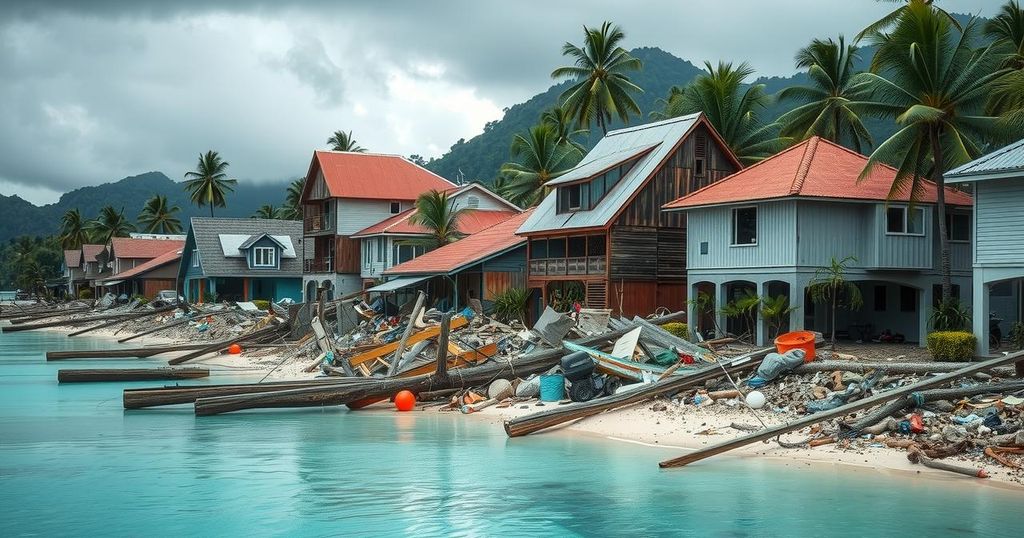Cyclone Chido and Vanuatu Earthquake: Humanitarian Crises Demanding Urgent Response
Tropical Cyclone Chido has devastated Mayotte, Comoros, and Mozambique, with a reported death toll of at least 22 and rising. Meanwhile, a 7.3-magnitude earthquake struck Vanuatu, compounding the humanitarian crisis. Direct Relief is actively assessing needs and coordinating medical support in these affected regions, emphasizing the health risks and urgent need for assistance in disaster-stricken areas.
Over the weekend, Tropical Cyclone Chido struck the Mayotte archipelago, Comoros, and Mozambique, leaving a trail of destruction and loss of life. This unprecedented storm has been labeled the most powerful to impact Mayotte in nearly a century, unleashing winds reaching over 140 miles per hour and surges of nearly 28 feet. Early reports indicate that approximately 22 fatalities have been confirmed in Mayotte, although the full toll is anticipated to escalate. Alongside this calamity, a 7.3-magnitude earthquake struck Vanuatu, further compounding the humanitarian crisis in the region, with initial assessments indicating widespread damage to infrastructure, notably health facilities, as aftershocks continue to pose risks.
President Azali Assoumani of Comoros has declared a week of mourning for those lost as the nation grapples with enormous damage to its infrastructure. Meanwhile, Mozambique, already vulnerable to severe storms, faced Chido’s direct impact with winds exceeding 160 miles per hour causing extensive destruction. Direct Relief is engaged in evaluating the needs of affected communities, liaising with emergency response agencies in Mayotte, and working with health partners in Comoros and Mozambique to facilitate urgent medical support as assessments are finalized.
In Vanuatu, the situation remains precarious as damage assessments unfold, but the destruction to homes and hospitals has been significant. Direct Relief is coordinating with local healthcare partners and is dispatching emergency medical supplies to assist the population. Natural disasters such as cyclones and earthquakes present immediate threats to health, resulting in mass casualties and overwhelming local health systems. The aftereffects can lead to disease outbreaks, displacement, and interruptions in chronic health care.
Direct Relief has a storied history of disaster response, delivering critical medical resources during past crises, including Cyclone Idai and the 2010 Haiti earthquake. With a focus on ensuring timely assistance, Direct Relief has positioned resources and partnerships strategically to mitigate the health impacts of disasters. Presently, as the ramifications of Cyclone Chido and the Vanuatu earthquake continue to unfold, Direct Relief remains devoted to providing vital medical care and facilitating recovery for the affected communities.
This sequence of catastrophes emphasizes the urgent need for sustained humanitarian intervention in affected areas, with organizations like Direct Relief playing a vital role in delivering necessary aid to save lives during such crises.
In recent days, Tropical Cyclone Chido severely impacted the Mayotte archipelago, Comoros, and Mozambique, marking a week characterized by devastating natural disasters. The cyclone has been declared the most formidable to strike Mayotte in years, resulting in extensive damage and a rising death toll. Additionally, a separate 7.3-magnitude earthquake in Vanuatu has introduced further turmoil, affecting infrastructure and health facilities. These incidents highlight the vulnerabilities of already precarious communities and underline the importance of disaster response efforts to mitigate human suffering and health risks.
The calamities brought on by Cyclone Chido and the earthquake in Vanuatu underscore the pressing requirements for humanitarian assistance. Organizations like Direct Relief are pivotal in assessing needs and providing immediate medical supplies, thereby bolstering the healthcare infrastructure under severe strain due to such natural disasters. The ongoing commitment to disaster response ensures that affected regions are equipped to recover, highlighting the crucial role of collaborative efforts in rebuilding and maintaining health systems post-disaster.
Original Source: www.directrelief.org




Post Comment